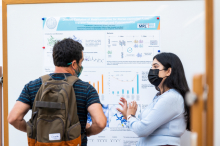
Major:
University:
Mentor(s):
Faculty Sponsor(s):
Faculty Sponsor's Department(s):
Project Title:
Project Description:
Biological catalysts, such as enzymes, are preferred when compared to other catalysts due to their non-toxic, sustainable, and biodegradable components. Improvements in tacticity, or configuration, can affect the radical polymerization, polymer properties, and the stereochemistry of polymers. Due to the distinctive reductive and oxidative activity of metallocofactors, metalloenzymes have the potential to facilitate new-to-nature redox radical transformations for polymerization. Furthermore, the stereochemistry can be controlled by fine tuning the active site of metalloenzymes via directed evolution. Here, we discuss the directed evolution of metalloenzymes for atom transfer radical addition (ATRA) and atom transfer radical polymerization (ATRP). Directed evolution involves repeated rounds of mutation and selection. Directed evolution via iterative rounds of site-saturation mutagenesis and screening provides a set of highly active metalloenzyme catalysts for stereoselective ATRA. The evolved biocatalyst will be characterized using electrochemical techniques and protein crystallography to understand the origin of their enhanced reactivity and selectivity. For bioATRP, we focused on the engineering of a thermophilic protein, cytochrome c, from the bacteria, Rhodothermus marinus. Engineered metalloenzyme catalysts hold the potential to exert excellent control over molecular weight, dispersity, and tacticity.
